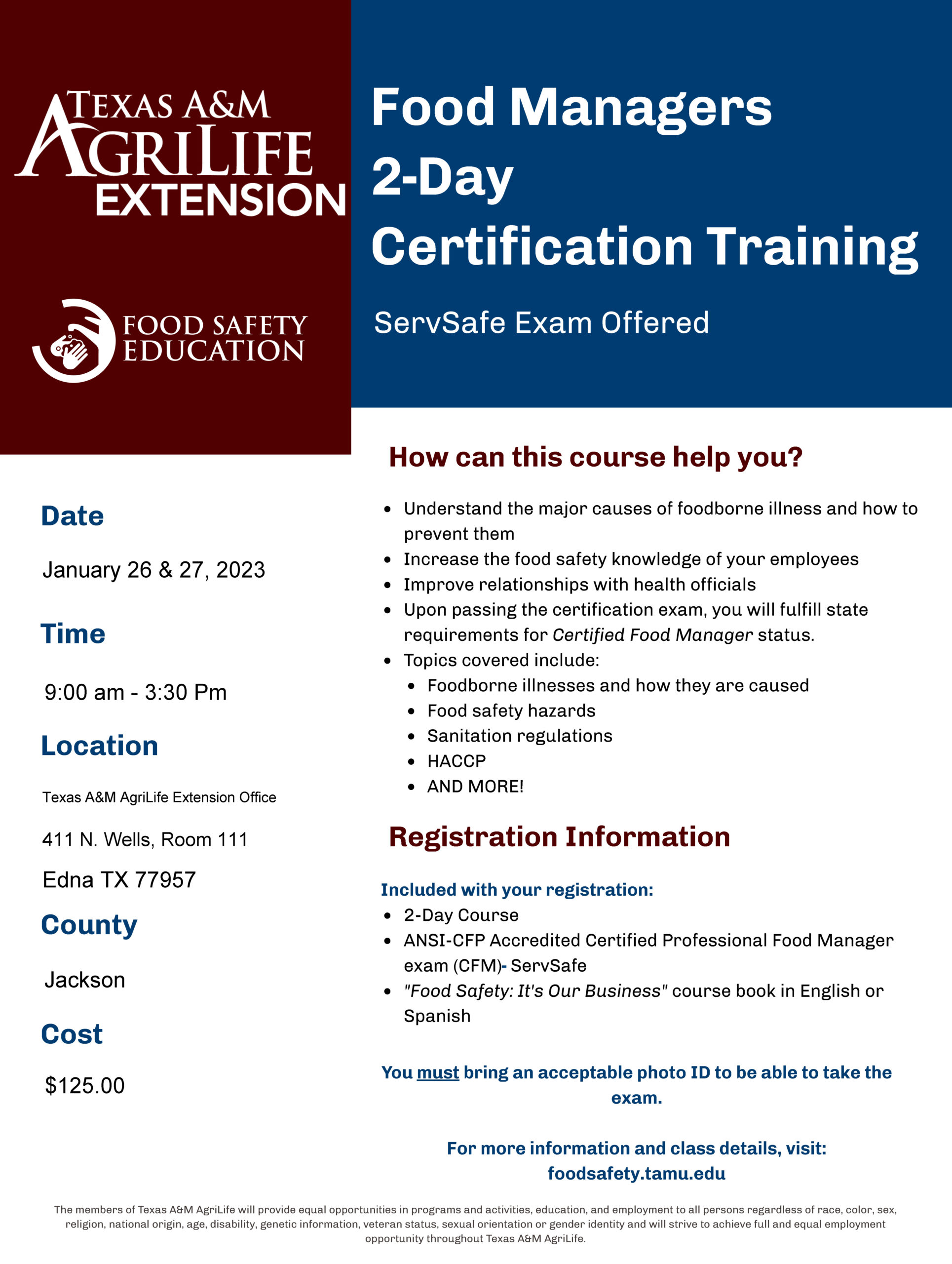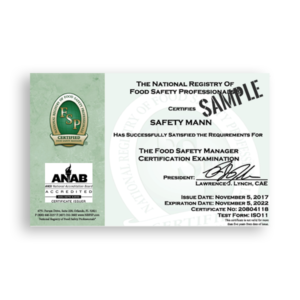A Newbie's Overview to ServSafe Food Manager Certification Preparation
A Newbie's Overview to ServSafe Food Manager Certification Preparation
Blog Article
Qualified Food Supervisor: The Secret to Safe and Compliant Operations
The role of a Certified Food Manager (CFM) is significantly recognized as essential in preserving certified and risk-free operations within the food solution industry. By applying strenuous food handling and preparation criteria, CFMs play a pivotal role in mitigating dangers associated with foodborne diseases and guaranteeing adherence to governing requirements. Nevertheless, the effect of their experience expands past conformity; it cultivates a setting of responsibility and operational efficiency. Understanding the full range of their contributions questions regarding the wider ramifications for organizations and customer count on food security methods.
Duty of a Certified Food Supervisor
The function of a Certified Food Supervisor is vital in ensuring food safety and security and conformity within food service establishments. These experts are in charge of supervising all aspects of food storage space, handling, and preparation, making certain that centers stick to wellness policies and industry criteria. Their training furnishes them with the understanding to recognize possible hazards, execute appropriate food security methods, and preserve sanitation protocols.
Licensed Food Supervisors play a crucial duty in training and overseeing cooking area team, instilling a culture of safety and security and compliance throughout the facility. They carry out normal assessments to recognize locations that require improvement and guarantee that corrective actions are carried out quickly - ServSafe Manager. Additionally, they are charged with developing and imposing standard operating procedures (SOPs) pertaining to food safety, which work as a guide for employees
Their experience includes keeping track of food temperature levels, protecting against cross-contamination, and taking care of irritant controls, every one of which are important to securing public wellness. Licensed Food Managers are often the primary point of call throughout health examinations, representing their establishments and addressing any type of compliance concerns raised by health authorities. Inevitably, their dedication to food safety and security is important for keeping consumer trust and protecting the reputation of food solution businesses.
Relevance of Food Security
Food safety and security is continually a leading concern in the food solution sector, as it straight affects public health and wellness and consumer self-confidence. Making certain that food is handled, prepared, and stored safely assists to stop foodborne health problems, which can result in severe health and wellness problems and also fatalities. The economic consequences of foodborne episodes can be shocking, causing expensive recalls, lawsuits, and substantial damages to an organization's track record.
Additionally, food safety and security practices foster a culture of responsibility and professionalism and reliability within food facilities. When employees are learnt appropriate food taking care of strategies, they are more probable to comply with security protocols, which lessens the threat of contamination. This not only shields customers however likewise improves operational efficiency and compliance with local wellness laws.
Customer awareness regarding food safety and security has increased significantly, resulting in increased expectations for openness and high quality in food service. Establishments that prioritize food safety are more probable to obtain customer count on and commitment, inevitably adding to their long-lasting success. Spending in durable food safety procedures is not simply a regulatory responsibility; it is a basic service strategy that benefits both consumers and food solution operators alike.
Training and Certification Process
Comprehending the training and accreditation process for food managers is critical for preserving high criteria of food security within any facility. The process generally starts with extensive training programs that cover vital subjects such as foodborne diseases, appropriate food handling techniques, and cleanliness methods. ServSafe Manager. These programs can be supplied with different layouts, including on the internet training courses, in-person courses, or workshops, and are designed to equip food managers with the understanding essential to avoid food security hazards
Upon conclusion of the training, candidates should pass a qualification test, which evaluates their understanding of food safety and security principles and laws. The examination is normally administered by recognized companies, making sure that the certification is identified and valued within the market.
Once licensed, food managers are called for to remain present with ongoing education and learning and training to keep their qualifications. This might consist of participating in correspondence course or participating in workshops that attend to brand-new food safety techniques and guidelines. On the whole, a durable training and certification process not just improves the abilities of food you can look here managers yet also adds to the general safety and compliance of food operations in any type of facility.
Compliance With Regulations
Conformity with policies is an essential aspect of a food manager's duties, as it makes certain that establishments comply with regional, state, and federal food safety and security requirements. These guidelines are made to reduce dangers related to foodborne ailments and promote safe food taking care of methods. A certified food manager (CFM) plays a crucial duty in translating and implementing these requirements within their operations.

CFMs must additionally apply and develop surveillance systems to frequently assess compliance with food safety and security practices. Eventually, efficient conformity administration promotes a society of safety and liability within food service procedures.

Advantages of Employing CFMs
Hiring licensed food supervisors (CFMs) supplies considerable advantages for food service establishments looking for to improve their functional effectiveness and safety and security standards. CFMs have specialized knowledge of food safety guidelines, sanitation techniques, and danger monitoring, guaranteeing conformity with regional and government legislations. This proficiency aids minimize the possibility of offenses that can cause short-lived closures or costly fines.
In addition, CFMs play an important function in training team, promoting a society of food safety and security within the facility. They carry out standard treatments, monitor food handling techniques, and carry out normal audits, considerably lowering the danger of foodborne health problems. This not only secures customers but additionally enhances the establishment's online reputation.
In addition, working with CFMs can bring about improved operational performance. Their training enables team to work more effectively, reducing waste and taking full advantage of performance. Facilities with qualified food supervisors typically experience higher customer fulfillment, as trained employees are much better geared up to guarantee quality service and food safety.

Eventually, spending in a licensed food supervisor is an investment in the long-lasting success and sustainability of a food service procedure, developing a more secure setting for both consumers and workers.
Verdict
To conclude, the function of a Certified Food Supervisor is vital important site in maintaining certified and secure food service procedures. Via reliable oversight of food managing techniques, recurring team training, and adherence to regulative criteria, CFMs play a critical role in mitigating foodborne disease risks. The investment in licensed monitoring not only improves operational effectiveness but likewise cultivates a culture of accountability, inevitably profiting both the facility and its patrons while advertising public wellness and security.
The function of a Licensed Food Manager is essential in ensuring food safety and conformity within food service establishments.Understanding the training and qualification process for food managers visit here is crucial for preserving high requirements of food safety and security within any type of establishment. Generally, a durable training and accreditation process not only boosts the skills of food managers however also adds to the overall security and conformity of food operations in any type of facility.
Employing qualified food supervisors (CFMs) uses considerable advantages for food solution facilities seeking to boost their functional effectiveness and safety criteria. Facilities with licensed food supervisors usually experience higher client satisfaction, as trained workers are better furnished to ensure high quality service and food security.
Report this page